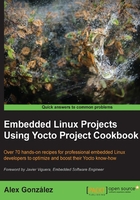
Introduction
The Yocto project (http://www.yoctoproject.org/) is an embedded Linux distribution builder that makes use of several other open source projects.
The Yocto project provides a reference build system for embedded Linux, called Poky, which has the BitBake and OpenEmbedded-Core (OE-Core) projects at its base. The purpose of Poky is to build the components needed for an embedded Linux product, namely:
With these, the Yocto project covers the needs of both system and application developers. When the Yocto project is used as an integration environment for bootloaders, the Linux kernel, and user space applications, we refer to it as system development.
For application development, the Yocto project builds SDKs that enable the development of applications independently of the Yocto build system.
The Yocto project makes a new release every six months. The latest release at the time of this writing is Yocto 1.7.1 Dizzy, and all the examples in this book refer to the 1.7.1 release.
A Yocto release comprises the following components:
The Yocto 1.7.1 release is available to download from http://downloads.yoctoproject.org/releases/yocto/yocto-1.7.1/.